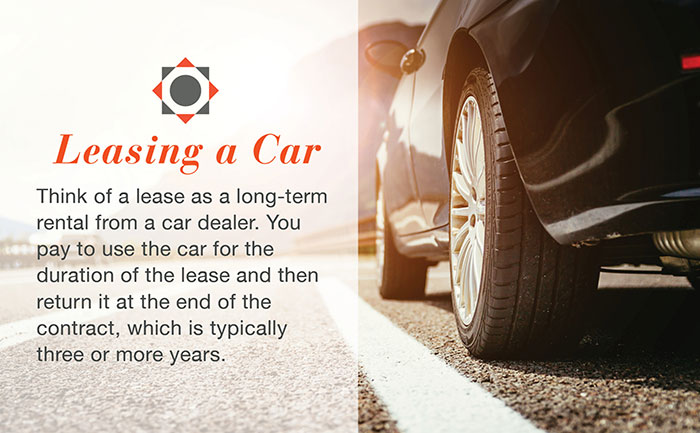Deciding what’s right for you
In the market for a new car? One of the first questions you’ll have to address is whether purchasing or leasing a car is right for you. Each option has its advantages and disadvantages, depending on what situation you’re in. Let’s take a look at some of the key differences between purchasing and leasing a car.

Leasing a car
Think of a lease as a long-term rental from a car dealer. You pay to use the car for the duration of the lease and then return it at the end of the contract, which is typically three or more years. While you pay to use the car for that period of time, you never end up owning the car.
The monthly payments for a lease tend to be lower than what you’d pay on a loan if you were to buy the car, therefore making a lease appealing for short-term financial reasons. Certain maintenance costs might also be included in your lease, potentially sparing you some of the costs associated with owning a car. But there are often mileage limits on a leased car, and you can be charged extra for any miles you go over the limit.
Buying a car
On the other hand, buying a car appeals to those who anticipate driving a substantial number of miles or those who want their car payments to go towards building equity. When you lease a car, you’ll be making monthly payments for as long as you need to have a car. But when you buy a car, you only make payments until the value of the car has been paid off (via an auto loan). This is seen as an advantage of buying a car, especially a new one that you’re likely to drive for a while without having to continue making monthly payments. Buying, unlike leasing, gives you the flexibility to sell or trade in your car if you decide you want a new car or no longer need to drive a car at all.
While a lease might appear more affordable in the short term, many people take the view that owning the car will be worthwhile for them in the long term.
Making an informed decision
When deciding if you should lease or buy a car, it’s important to factor in how much you can pay up front and on a monthly basis, how many miles you plan to drive, and what your long-term goals are. With all of these factors in mind, it’s important to discuss these details with a dealer and negotiate thoroughly to land on the best option for you.



